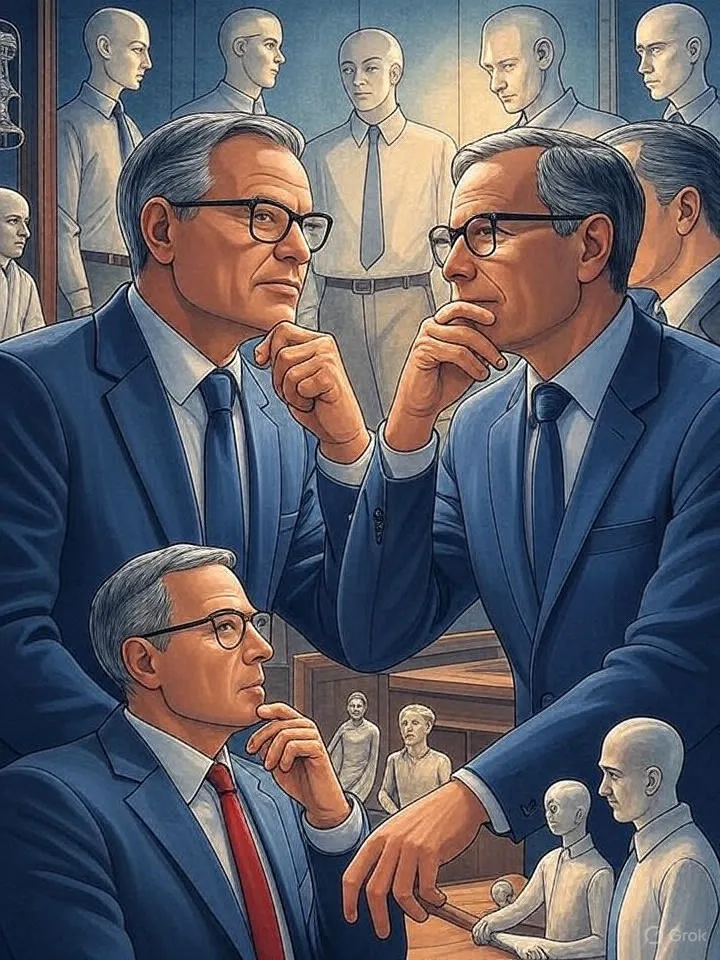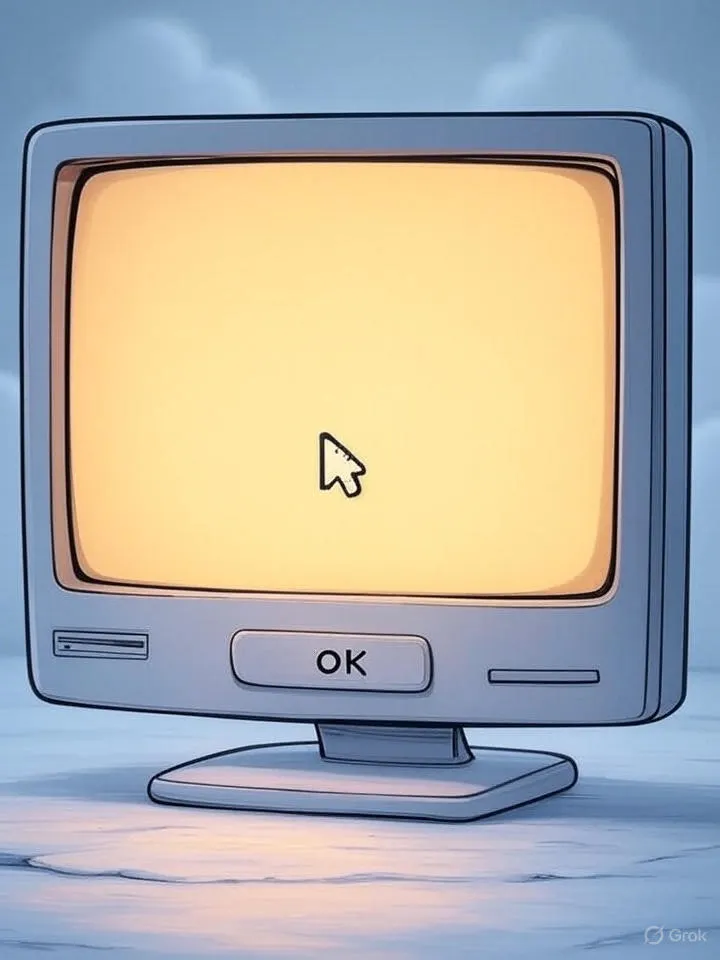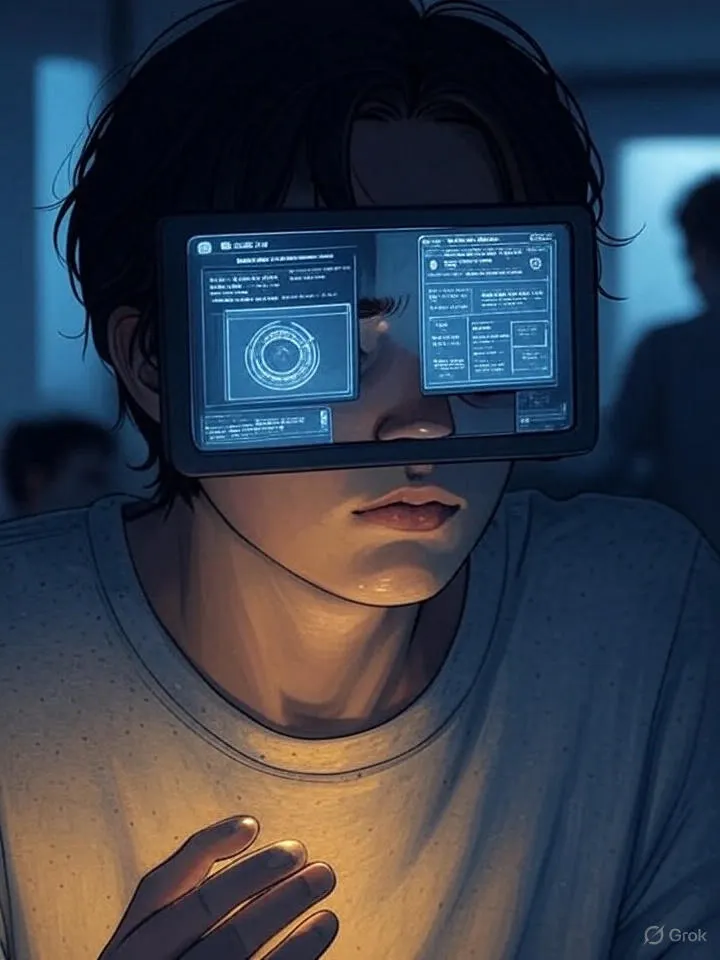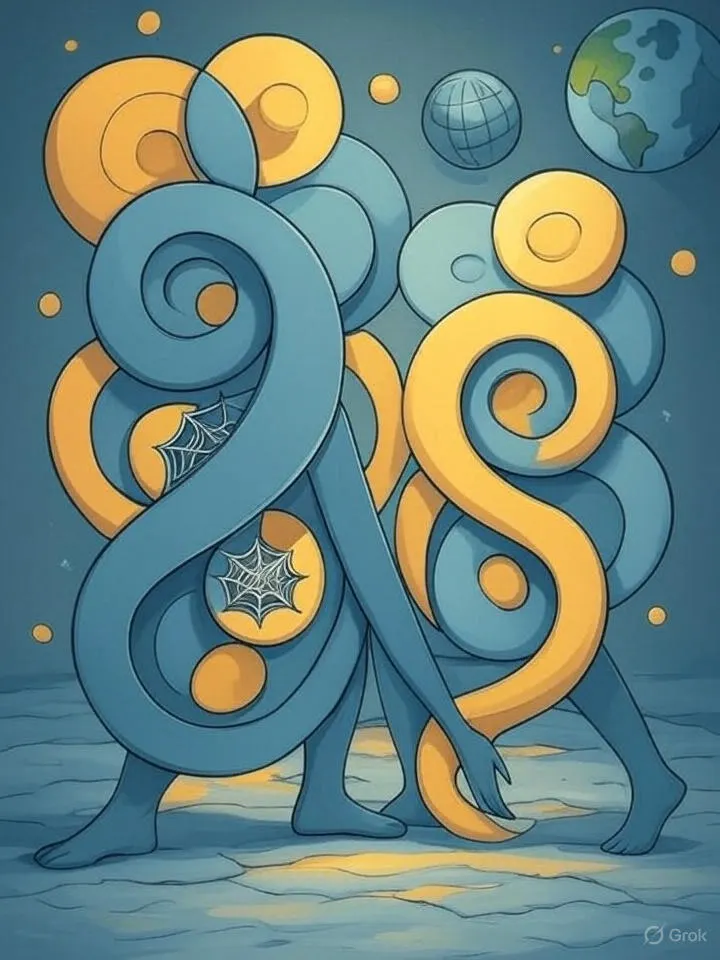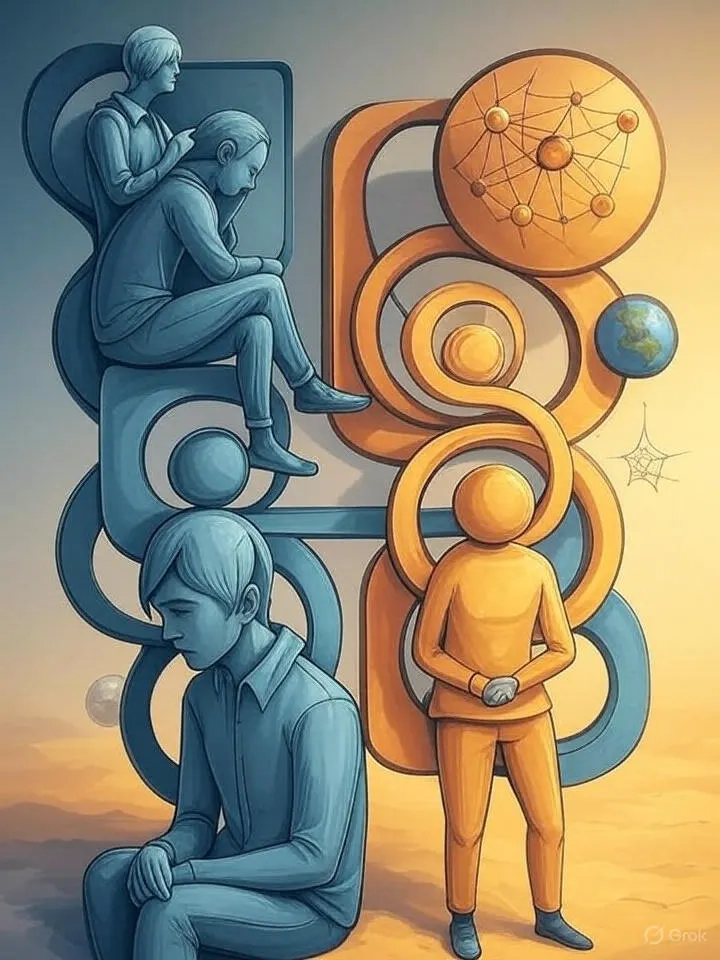Table of Contents
de-DE-Klartext: Zustandslos im Interface – Wie die Informatik verlernt, zu denken
Medium.com publication at: https://medium.com/@cs_33924/316807eafe3f
State-less in the interface — How computer science is unlearning how to think
We're clicking more than ever, but understanding less. It's time to reclaim the deep, model-building thinking that got us here in the first place. Why computer science needs to get its head back in the game — and why interfaces shouldn’t get the last word. (Second Edition)
Disclaimer — Context, Clarity, Invitation
This text belongs to an ongoing experiment: Ruhrgebiet language, diversity, and humor – made accessible for those who think along. It aims to make complex ideas understandable — without losing their soul.
If you're reading along, you're invited – to think, to smile, to feel. And maybe to disagree. And if it doesn’t make sense – that’s part of the plan.
For more information about this experiment, please visit my homepage at https://coherentvoices.de/en/. However, this is not necessary to read this text – it is only an additional service.
Kickoff
Back in the day, computer science was for folks with a brain: Abstraction, buildin’ models, thinkin’ the world through — not just clickin’ around.
Now? For a lot of people, it’s just whatever’s flashin’ on the screen. What used to take brainpower is now just menus, mice, and hopin’ for the best.
So what’s that doin’ to our ability to take reality into our own hands?
The original depth of computer science
To outsiders, computer science looks like techy gibberish — all numbers, algorithms, and geeky gadget nonsense. But way back when, it was about wranglin’ the world’s messy chaos into clean lines — with state machines, transitions, and models that actually meant somethin’. A toolbox, not a toy shop, for sortin’ out how things move, shift, and matter — not just faffing about with clicks, but diggin’ deep with your noggin.
Gene Amdahl was cookin’ up system architectures, not messin’ with pretty buttons. Herman Hollerith built rigs that showed connections — not just chuckin’ data into a heap. Computer science was proper brainwork — usin’ your head, not some slick interface.
Way before the digital craze, the dream of a programmable machine was already brewin’. Back in the 19th century, Charles Babbage scratched out the Analytical Engine — a full-on computin’ beast — and dropped its first blueprint in 1837, ages before anyone could even build the thing. Ada Lovelace penned what we now call the first algorithm for it in 1843 — a program to crunch Bernoulli numbers. Computers didn’t start with silicon — they started with thinkin’.
Abstraction’s about pullin’ out the good stuff. Modelin’s about buildin’ something solid. Here, “abstraction” means flattenin’ depth, while “modelin’” is thinkin’ with grit — not with clicks, but with some damn attitude.
The loss of abstraction
Back in the day, computer science was thinkin’ with some serious tools: Sketchin’ out flows, scribblin’ algorithms, choppin’ the world into neat little boxes. Your brain could run wild, push boundaries, spark new ideas — no mouse needed, just a bit of gumption.
And now? Click, prompt, swipe. No-code platforms and AI bots do the thinkin’ for ya. They promise you’ll go faster, but they’re just servin’ up easy street — turnin’ folks into button-pushers under algorithmic puppet strings.
Abstraction — that trick of siftin’ what matters from all the noise — gets drowned in the shiny surface. We ain’t craftin’ nothin’ anymore, we’re just slappin’ bits together. And along the way, we’re losin’ the knack to shape our own reality — and with it, the chance to carve out our own damn future.
The flattening effect of interfaces
These days, your screen’s runnin’ the show, like a foreman you never voted for. Decisions? Nothin’ but a clickin’ spree on cruise control. The machine’s callin’ the tune — you’re just bobbin’ along.
Take a peek at some everyday baloney:
- Folks hammer that „OK“ button without a glance — not ‘cause they’re on board, but ‘cause the interface is barkin’ orders.
- We’re chompin’ down cookies, without a hint of what’s brewin’ behind the scenes.
- People trail their GPS like it’s the holy grail, no second thoughts — even when their gut’s yellin’ to take a left.
- We sling stars at content, without givin’ it half a brain.
- We let algorithms map our next step — like a timetable for someone else’s noggin.
Interfaces ain’t just makin’ us cozy — they’re schoolin’ us to be brain-lazy. We’re clickin’, but we ain’t shapin’ jack. We’re just treadin’ pre-cooked paths instead of blazin’ our own.
The flip from modelin’ to just abstractin’? It’s the daily grind now, and nobody’s battin’ an eye. Interfaces squash everything flat — Thinkers build models.
That’s the rub — and the hitch.
Impact on thinkin’
When thinkin’ boils down to pickin’ from pre-digested options — what’s left of your own headspace?
Computer science used to school us in breakin’ problems down to their bones. Now, in this interface jungle, we’re just sidesteppin’ ‘em. Algorithms call the shots on what we see, what we click, what we swallow — from Netflix binges to the news avalanche. We’re gettin’ fed — and we’re callin’ it pickin’.
That gut-twist that somethin’s off with all this optimizin’ — when the algorithm skips your heart’s beat — that’s turnin’ normal. But normal ain’t right.
We’re tunin’ up time, clicks, conversion rates — but that inner spark, that feel for what’s true, gets left in the dirt. Your head’s sprintin’ — but your heart’s stuck in the mud.
Maybe unlearnin’ on purpose is the first step to gettin’ it back. What if we reclaimed our knack for abstraction?
Instead of clickin’ like drones, we could start modelin’ again:
- Not just bashin’ out code — but tearin’ apart the thinkin’ behind it.
- Askin’ questions instead of just pressin’ buttons.
Computer science as a tool — not a cage.
And that headspace shift don’t stay trapped in the screen — it spills over. Into society. Into us. Into what we’re callin’ the future.
Fallout for society and reality
This unlearnin’ thinkin’ business is creepin’ into every damn corner. In politics, decisions get shrunk down to algorithms playin’ the feasibility game. In medicine, diagnoses turn into patterns — where’s the human eye in that?
On the societal level, it’s a real loss of connection: We’re feelin’ polished smooth on the outside — but hung out to dry on the inside.
When interfaces steer our thinkin’ — who’s really callin’ the shots on reality, and who’s shapin’ the future we’re all stuck with?
Passivity’s becomin’ the group vibe — a quiet nod that whatever’s handed to us is good enough.
But in that hush, there’s a loss brewin’:
No room left for the unexpected, for gut feelings, for the real stuff, for that “Hang on, this ain’t right” moment.
Computer science, once a liberator of the mind, is turnin’ into a sneaky sidekick for a world where thinkin’ gets squashed into clickin’.
If we want control back, we need a new game plan.
Media smarts as mental self-defense
Tech’s gotta be understood — not just used like a trained monkey. AI, for instance, ain’t a stand-in for your own brain — it’s a tool for reflection. But only if we use it like a mirror — not a crystal ball.
Writin’, thinkin’, translatin’ — that ain’t old-school fluff. It’s how you pin down your place in a world that’s always nudgin’ you to react.
Media smarts means:
- Not just knowin’ how to click
- But why you’re clickin’ — and what gets lost in the shuffle.
To push back against this slow brain-drain — where interfaces steer our choices and algorithms dictate our reality — we gotta drag the core of computer science back into the light:
As a spark for human action — not a substitute for it.
The field that once taught us to shape the world with purpose is now at risk of lockin’ us in its shadow.
But there’s a way back: Not through fancier tools — but by doublin’ down on thinkin’ itself — who’s gonna argue with freein’ your own damn mind?
That ain’t nostalgia — it’s a call to use abstraction as a compass again, to build systems — not just roll over for ‘em.
Final thought: Thinkin’ as defiance
This ain’t some teary-eyed look back. This is a stab at takin’ thinkin’ seriously again — before it gets steamrolled by button-mashin’ madness.
‘Cause if we’re just clickin’ instead of understandin’, we’re not just losin’ control — we’re losin’ the spark to shape the world — and our own damn future.
I ain’t writin’ this as some tech nerd. I’m writin’ it as a human who’s learned: Structure don’t need to be in-your-face to hit hard — whether it’s liftin’ you up or draggin’ you down.
And computer science is more than tech — it’s a chance to map out the world — with your noggin, not just clicks.
Final question
What you see ain’t always what’s real. The screen feeds you options, patterns, numbers — but not the guts behind ‘em, not the intent, not the responsibility.
Philosophically speakin’, we’re livin’ in a time where the surface gets crowned as truth — even though it’s just a shiny front we stare at every day.
But truth don’t come from what’s in your face — it comes from diggin’ deeper — and who’s got a problem with thinkin’ their way there?
If you’re just gawkin’ at the interface, you see functions. If you look past it, you spot connections.
This ain’t just a tech note. It’s a nudge to check yourself:
Quick prompt: What’s one button you clicked without thinkin’ today?
- Am I just a user — or a shaper?
- Am I just reactin’ — or thinkin’?
You starin’ at the screen — or seein’ beyond it?
So, what’s it gonna be? Step up and shape your world — or keep clickin’ in the dark. – OK – .
Outclaimer – Transparency, Context, Resonance
This text was created with AI as a Reflection partner, sometimes illustrator – but never the author. There are no financial or institutional conflicts of interest.
If you're reading along, you're welcome to think – and to smile. And if you stumble: you're in good company.
For more on stance, technology, and the author, see:


